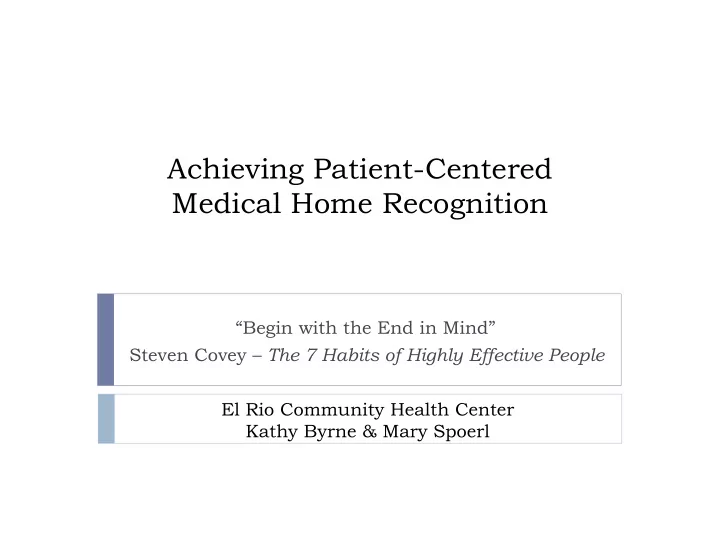

Achieving Patient-Centered Medical Home Recognition “Begin with the End in Mind” Steven Covey – The 7 Habits of Highly Effective People El Rio Community Health Center Kathy Byrne & Mary Spoerl
Presentation Objectives Overview of PCMH / NCQA Survey El Rio’s Experience Current Status Timelines Implementation Process Key Steps and Lessons Learned PCMH Initiatives Barriers / Challenges Costs / Benefits
A Medical Home Patient Engagement Provider and Self Management Leadership Care Coordination Continuity Care T eams & T eams Access Change T eams Data Driven
Patient-Centered Medical Home Characteristics Personal Physician 1. Team-Based Care: NP/PA Physician directed medical practice 2. RN/LPN Medical Assistants Whole Person Orientation 3. Office Staff Individual Care Plan Care Coordinators a. Acute Nutritionists/Educators i. Preventive ii. Pharmacists Chronic Illness iii. Behavioral Health End of Life iv. Case Managers b. Self-Management Support Community Resources Others Care is Coordinated 4. Patient Specialists tracking a. Family/Support System b. Linkage to community services Care transitions c. Quality and Safety 5. Patient registries a. b. E-Prescribing Electronic Health Record c. d. Test Tracking Performance Reporting e. Enhanced Access to Care 6. Patient Portal a. Payment structure that recognizes services and value 7.
PCMH 2011 Content and Scoring
Must Pass Elements – Designated elements that a practice must pass at a score of ≥ 50% to achieve NCQA recognition. Critical Factor – A factor identified as central to the concept being assessed within particular elements and is required for practices to receive more than minimal or, for some factors, any points. Critical factors are identified in the scoring section of the element. Meaningful Use Requirements – The CMS implementation of the American Recovery and Reinvestment Act (ARRA) of 2009 (Recovery Act) provides incentive payments to eligible professionals for adopting and demonstrating meaningful use of certified EHR technology. Criteria for meaningful use are electronically capturing health information for care coordination and reporting clinical quality measures and public health information. Stage 1 has 25 requirements, including 15 Core Requirements that must all be met and 10 Menu Requirements, 5 of which must be met.
A Simple Comparison
Must Pass Elements require a ≥ 50% Performance
Timelines Received Submitted Results Administration/Board – November 2009 Project Started --------- January 2010 2008 Survey Organizational/Group Application Nov 23, 2010 Dec 1, 2010 El Pueblo Peds/Fam Medicine Feb 7, 2011 April 1, 2011 Pascua Peds/Fam Medicine Feb 8, 2011 April 1, 2011 Northwest Peds/Fam Med/Int Med March 8, 2011 April 1, 2011 Southeast Peds/Fam Medicine March 9, 2011 April 1, 2011 Congress Fam Med/Int Medicine March 17, 2011 June 6, 2011 Southwest Peds/Int Medicine April 12, 2011 June 6, 2011 Congress Pediatrics June 3, 2011 July 13, 2011 2011 Survey Project Started-----------November 2011 Special Immunology Pending Broadway Pending CMS Grant Pending
Begin the Process – Key Steps Project Leader 1. Education / Awareness / Messaging 2. Steering / Advisory Committee 3. Baseline Assessment / Timelines 4.
Begin the Process – Key Steps Project Leader 1. Education / Awareness / Messaging 2. Steering / Advisory Committee 3. Baseline Assessment / Timelines 4. PCMH/MU Work Approach Example PCMH MU Element 5C: Goal C: Coordinates with facilities and Improve Care Coordination care transitions Measures – Provides electronic care summary to another care facility (for at least 50% of transitions of care and referrals) Workplan Assessing EMR capabilities Producing reports Process Redesign & Workflow Writing policies and procedures System Configuration & Upgrades Producing Screen Shots & Documentation Addressing Overlaps between PCMH & MU
Begin the Process – Key Steps Project Leader 1. Education / Awareness / Messaging 2. Steering / Advisory Committee 3. Baseline Assessment / Timelines 4. Information Technology / Meaningful Use 5. Assessment and Timelines Chart Reviews / Continuous Data 6. Improvement
Chart Review 48 Charts – 12 for each significant condition 3C – Care Management: (must pass) 1. Conducts pre-visit preparations 2. Collaborates with patient/family to develop individual care plan, including treatment goals reviewed and updated at each relevant visit 3. Gives the patient/family a written plan of care 4. Assesses and addresses barriers when the patient has not met treatment goals 5. Gives the patient/family a clinical summary at each relevant visit 6. Identifies patients/families who might benefit from additional care management support 7. Follows up with patients/families who have not kept important appointments 3D – Medication Management 1. Reviews and reconciles medications with patients/families (critical factor) 2. Provides information about new prescriptions to patients/families 3. Assesses patient/family understanding of medications for patients with data of assessment 4. Assesses patient responses to medications and barriers to adherence for patients with date of assessment 5. Documents over-the-counter medications, herbal therapies and supplements for patients/families with the date of updates 4A – Support Self-Care Process: (must pass) 1. Provides educational resources or refers patient/families to educational resources to assist in self- management 2. Uses an EHR to identify patient-specific education resources and provide them to patients, if appropriate 3. Develops and documents self-management plans and goals in collaboration with patients/families (critical factor) 4. Documents self-management abilities for patients/families 5. Provides self-management tools to record self-care results for patients/families 6. Counsels patients’ families to adopt health behaviors Must Pass – must earn a score of 50% or higher Critical Factors – scores for an element will not exceed 0% if the identified critical factors are not met
Initiatives Related to PCMH Pre-PCMH Start-up: • EMR • Patient-Driven Scheduling • Patient Satisfaction Surveys • Cultural Competency Committee • Job Functions/Job Descriptions Post PCMH Start-up: • i2i/proactive outreach for preventive services • Proactive Referral Tracking • Patient Portal • RN Care Coordinators • Hospital Discharge Program • Nursing Committee – Patient Education/Counseling Protocols and Staff CDI • Performance Improvement Teams
What are the Challenges/Barriers to Implementation? Information Technology Quality Improvement Care Management / Outreach (utilizing non-physician staff) Wellness / Outreach Culture Changes Costs/Benefits Physician Incentives Practice Reimbursement
References & Research http://www.jointcommission.org/primary_care_medical_home_ prepublication_standards/
Contact Kathy Byrne, Executive Director (520) 670-3706 kathyb@elrio.org Mary Spoerl, Director of Innovation (520) 670-3766 maryas@elrio.org
Recommend
More recommend